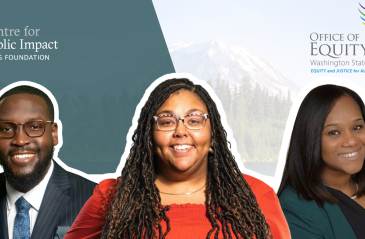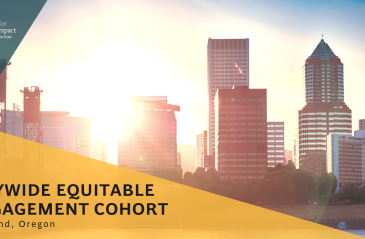
Five things we recently learned about difficult conversations

“Government does nothing for me, but my social worker is great” - the disconnect our #PeoplesPanel is hearing between people and government
Share articleWhat role should government play in helping people feel that they #belong? Our #PeoplesPanel sees it differently for national and local
Share articleThe CPI #PeoplesPanel is working with us on #FingingLegitimacy. This month's topic? The role of government in helping us feel that we belong
Share articleWe put our vision for government into practice through learning partner projects that align with our values and help reimagine government so that it works for everyone.
We've recently been exploring the concept of belonging — what it looks like when government understands citizens' need to belong, but how too often it doesn't. As this came up during the first meeting with our People's Panel in April, we decided to dig a little deeper on the topic in our second meeting with this trusted group of advisers earlier this month.
We've been hearing from citizens around the world for a while now that there is a spreading feeling of disconnectedness for many people: a feeling that they and their voices don't belong in their community or their country. We asked for help from our People's Panel to understand more about what they think has generated this feeling, how it manifests in the UK, and what they think the national and local government in the UK can do to help people feel that they belong.
To spark the conversation, we shared a short discussion paper outlining what we have heard to date, and what we have seen government do in an attempt to tackle this issue.
What we heard from our People's Panel was a resounding sense that this is an issue for many people in the UK. Many seem to feel isolated from society and that things are changing — and they feel left behind. There was also discussion over the differences between belonging to a community and a country. You can feel you belong in your country, but not feel very connected to your community — and vice versa. It was clear from our discussions that this is a complex issue, with many factors contributing and interlinking, but all agreed that this is something government, both local and national, should be thinking about. The role they can and should play — and understanding which part of governments plays which role best — is key.
[cta-finding-legitimacy imageurl="https://resources.centreforpublicimpact.org/production/2019/07/Custom-CTA-Image_-PP-Discussion-Paper.png" title="Download the discussion paper" description="Tell us what you think government's role should be in helping to cultivate a sense of belonging? Download the discussion paper for some questions to help get you started." linkUrl="http://bit.ly/ppdiscussionpaper" linkText="download"]
Our panel felt that the role for national government in helping people feel that they belong is quite different from that of the local government. Past national government attempts to generate a sense of belonging through national strategies — such as multiculturalism or the 'Big Society' — seemed to leave a sour taste in people's mouths, as it felt like putting a plaster on a deeper issue. With the Big Society specifically, our panel revealed a scepticism that the policy was even designed to help people feel like they belong — and not just to save the government money. This points to a level of distrust in the UK central government's ability to “fix” this issue.
So where is there hope? All of our panel pointed to local government.
Local government has the access, higher levels of trust and the sight into the community's lives, and it has the potential to utilise the local pride that naturally exists but is often undermined. Furthermore, people often feel more connected to their local representatives than the politicians from Whitehall that they see on TV — especially when national politicians use unhelpful rhetoric that causes divisions in society, like saying Muslim women wearing burkas “look like letterboxes.”
The panel also discussed the idea that there is a role to play for the mayor of a city to serve as the voice of the community — helping people feel more connected to the greater world of political decision-making by creating a tangible link between the community and Whitehall.
So how should national government empower local government to help foster this sense of belonging and help people feel more connected? Our panel talked about a real pride for the area they live in and discussed anchor institutions as an under-used asset that could play a huge part. Schools, community centres, town halls, businesses and other institutions that are already embedded in the community generate a deep sense of belonging in people if they are inclusive and orientated towards connecting people.
It is the little things that happen within communities, and often at these anchor institutions, that make people feel connected and that they belong.
So in their eyes, national government should stop with the grandiose plans for change, but invest in and release local government from their tight grip to enable them to realise their potential in people's lives. There are already so many small things that happened in communities that don't necessarily make the news or are worthy of a government paper, but significantly contributed to people feeling like they belong. Whether this is funding for street parties, having your own health worker visit regularly or the creation of community spaces like gardens or parks — that is what seemed to make a difference to people. And it is this stuff that is often forgotten or underfunded by national government, according to our panel.
It was clear that at the heart of a lot of the issues we discussed was an underlying question about who “government” was for our panel and citizens in general. The distrust of national government — in both the people who work in Whitehall and their ability to drive change for people — was palpable.
One of our panellists said that she often hears phrases like “government does nothing for me, but my social worker is great” — demonstrating the clear disconnect that exists between government and manifestations of government in local communities. People don't think of government as the people they come into contact with everyday, that help make a difference to their lives.
Government for many is an unknown force that sits in Westminster and whose effect many either don't feel or only feel negatively through the press, taxes or cuts to their local community.
Our panel suggested therefore, amongst other things, that we should celebrate our local services more, in an attempt to shift people's perception of who government is and how they can help them make their lives better.
All in all, it was clear that national and local government have a key role to play in helping people feel like that belong. But how so and the roles each played was clearly an important thing to think about to our panel. The need to empower local government to realise their potential to drive real change is something we have we have heard in our Future of Government conversations.
We want to hear from you. Does this feeling of disconnectedness and a lack of belonging resonate? Why? And what is government's role in addressing this problem? Are they doing enough or is this just not an area government can play a meaningful role?
This is a conversation that has only just begun, and we are just scratching the surface on understanding this issue and what government can do. We will be asking our People's Panel, our youth network and people on social media, as well as looking for partners to help us take this conversation forward.
Why not join us on this exciting journey? We invite anyone living in the UK to contribute to this debate and further our understanding on what can be done to help people feel like they belong.
***
CPI People's Panel is a group of people who are passionate about the impact that government can and should have on people's daily lives. We meet regularly to discuss issues that are front of mind for the group, and to gather insights that can feed into our work with government. Read more insights from our #PeoplesPanel.











